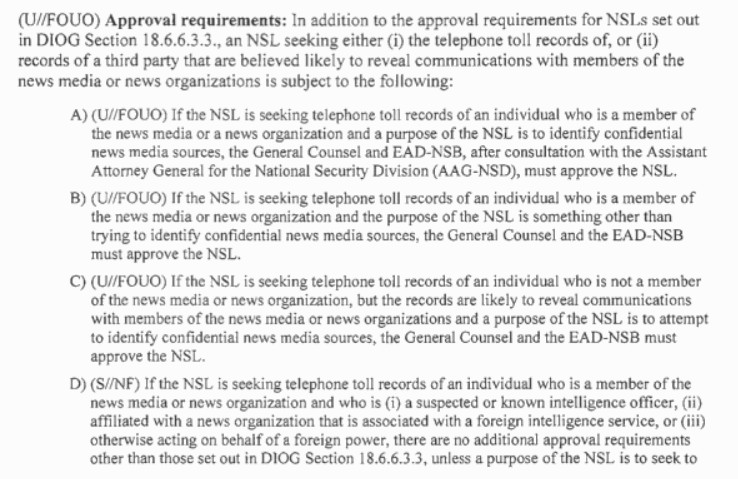Sign up for The Media Today, CJR’s daily newsletter.
For the past three weeks, two former FBI officials—Andrew McCabe and James Comey—have received wall-to-wall media coverage and substantial monetary support from people across the United States in the form of donations and books sales following their feuds with President Trump. But it’s a third former FBI official, unknown to virtually anyone—Terry Albury—who faces actual jail time from the Trump Justice Department and is far more deserving of the support of journalists everywhere.
A few weeks ago, Albury, a former FBI special agent based out of Minnesota, became the second person the Trump administration—after Reality Winner—prosecuted for allegedly leaking documents to the media. Critically, one of the documents he is assumed to have leaked directly impacts journalists’ rights and press freedom.
Today, Albury pled guilty in federal court to two counts under the Espionage Act, the World War I–era statute originally written to prosecute spies, which has been warped in recent years to allow the US government to imprison whistleblowers and sources to the press without giving them an opportunity to present a public interest defense.
ICYMI: Shep Smith’s reaction to the Sean Hannity fiasco was disappointing, to say the least
Albury’s attorneys released a statement to CJR just after the court hearing today, which reads, in part:
Terry Albury is a good and honorable man. His conduct in this case was an act of conscience. It was driven by his belief that there was no viable alternative to remedy the abuses he sought to address. He recognizes that what he did was unlawful and accepts full responsibility for his conduct, which he has demonstrated by reaching an agreement with the government to plead guilty.
Unfortunately, the government has kept quiet about many details of Albury’s legal case, but what he revealed and his subsequent statement to the public today shows him to be a quintessential whistleblower. Albury, according to government documents and press reports, is accused of being the source to a massive investigative project by The Intercept in 2016 entitled “The FBI’s Secret Rules,” which looked at the FBI’s confidential handbook for conducting investigations and many of the controversial tactics the agency uses when investigating political groups and religious and ethnic minorities.
As Albury’s lawyers state today:
For Terry, the only African-American field agent in the Minneapolis office, the problem of racism both within the FBI and in its interactions with minority communities was especially pronounced. The situation became even more acute for him when, having previously served a tour for the FBI in Iraq, he was assigned to the counter-terrorism squad, and was required first-hand to implement FBI investigation directives that profiled and intimidated minority communities in Minnesota and other locations in which Terry served.
The first story in The Intercept series is of special interest to all journalists. The Intercept revealed—for the first time—the FBI’s secret rules for targeting members of the press with National Security Letters (NSLs), the controversial and unconstitutional surveillance tool that requires no judicial review and comes with a gag order that makes them completely secret. The FBI can unilaterally serve an NSL on a telecom company like AT&T or Verizon to attempt to figure out who a reporter is talking to as part of a leak investigation.
ICYMI: Here are 5 things interns should NOT be used for in journalism
This document is critical to understanding how the Trump administration could go after journalists in its broader crackdown on leaks. In 2015, after several scandals involving the surveillance of reporters from the Associated Press and Fox News during the Obama administration, former Attorney General Eric Holder announced an update to the Justice Department’s “media guidelines,” which implemented strict rules for when the government is allowed to use subpoenas, court orders, or warrants to spy on reporters’ communications. However, the guidelines conspicuously exempted NSLs from the rules, meaning the FBI or Justice Department could use NSLs to circumvent the strict media guidelines and spy on reporters without any court oversight.
The separate rules for government NSLs targeting members of the media were instead buried in a classified section of the FBI’s “Domestic Investigations and Operations Guide,” unavailable for public view. Given the Trump administration’s quite public war on journalists, this fact could have huge consequences for press freedom.
These rules for targeting journalists with National Security Letters should have never been secret in the first place. The idea that knowing the bureaucratic sign-offs required to issue an NSL could damage national security is absurd. Keeping them secret does, however, avoid the embarrassment and public debate that would ensue if they were officially public. If you look at the unredacted rules published by The Intercept yourself, you can see nothing in them is remotely sensitive:

First, the rules confirm that the Justice Department can use NSLs for the express purpose of uncovering a journalist’s source or sources. Second, the only thing FBI officials need to do is get approval from its General Counsel or superior in the bureau’s national security division to do so. If the government wanted to get this same information through a subpoena or a court order, they would have to go through a multi-step process where they would have to prove that there is no other avenue to get this information, that it’s critical to an investigation, and then get approval from the Attorney General. It makes a mockery of the media guidelines, given the FBI can just use an NSL to sidestep those rules altogether.
At Freedom of the Press Foundation (where I serve as executive director), we’ve been suing the Justice Department for the official release of these rules for several years. Currently, along with the Knight First Amendment Institute at Columbia, we are demanding the Justice Department turn over the current version of this document, along with several others that pertain to their new crackdown on leaks.
Attorney General Jeff Sessions has already stated he’s going to “revisit” the Justice Department’s media guidelines (we’re suing for documents on any changes in Justice Department policy here too) and has announced a huge increase in the number of leak investigations being conducted by the Justice Department. So these documents are critical to understanding how Trump and Sessions are conducting their crackdown on whistleblowers and the press.
It is an abuse of the classification system to consider these rules kept from the public. Albury, if he did what he is accused of doing, should not be imprisoned for it. He should be looked at as a hero.
Disclosure: Freedom of the Press Foundation receives an annual grant from First Look Media, the Intercept’s parent company.
ICYMI: A pretty bad typo in the LA Times
Has America ever needed a media defender more than now? Help us by joining CJR today.



